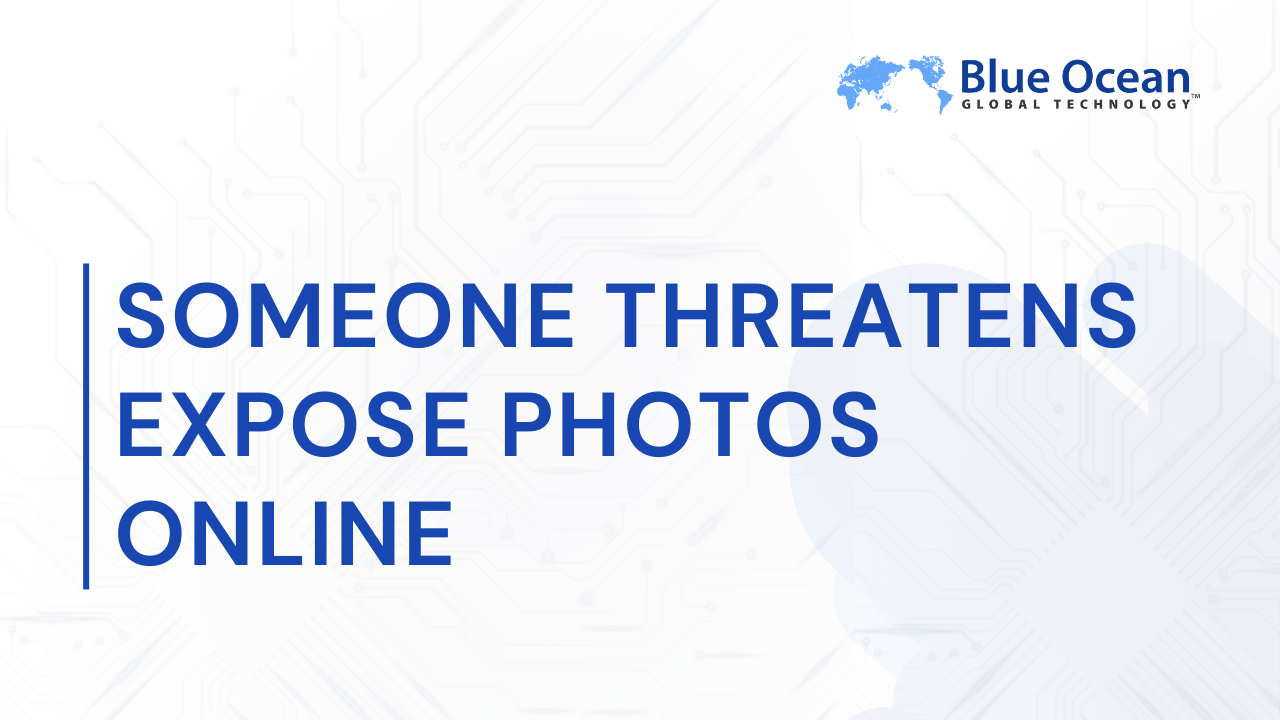Overview:
- This article gives tips and guidance on what a person should do if someone threatens to expose their photos online.
- Internet threats are likely to have adverse impacts on the health of victims.
- The article offers practical ways to help one to keep themselves on the internet and avoid scammers.
Connecting online is a normal part of life today. We chat with our friends, share fun moments, and meet new people. However, not all the people who are online are friendly or there to help or even in the right mind frame. Thus, personal information disclosure on the Internet brings certain levels of danger. There is always a limit to personal interaction, and we do not know what kind of person is behind the screen and their goals. They might trick you into sharing your intimate photos. Afterward, they may threaten to expose your images online if you don’t do what they want. In the US alone, ten million people have faced this kind of threat. It’s happening worldwide. If someone threatens to expose your photos online, this article will help you understand it better and protect yourself.
Source: Freepik
What is Image-Based Abuse?
If someone threatens to expose your photos online is called Image-based abuse. It is a technology-enabled type of gender-based violence that mostly affects women and girls but not exclusively. This occurs when someone threatens to release private or graphic pictures without their permission. A screenshot, a meme, or a fake photo that looks like you is an image-based abuse.
The victims frequently meet the blackmailer through a dating website. They often see photos of a stunning woman or a lovely man. This individual converses with the victim until they feel comfortable with them. Following that, they get the victim to photograph or record themselves in sexually explicit poses.
Once this is completed, they blackmail the victim by threatening to send the images to relatives and friends. Sometimes they threaten to modify the images so that they appear to be with someone or a child. They exploit the victim’s humiliation and terror.
Forms of Image-Based Abuse
Non-Consensual Distribution of Intimate Images (NDII)
Non Consensual Distribution of Intimate Images happens when someone shares images of another person without their consent.They may have been obtained willingly through the consent of the owners or may have been obtained and used without the consent. It’s a serious invasion of privacy that may cause pain and have a negative influence on victim’s relationships, and job. Unfortunately, in addition to the immediate impact, these photographs may remain online permanently, causing more harm over time.
Synthetic Intimate Images
Synthetic intimate images are sometimes known as deep fakes, fake nude applications, or digital forgeries. Synthetic intimate photos violate privacy by using artificial intelligence to insert someone’s face into explicit content without consent. Even though they are not “real,” synthetic images can deeply affect victims, causing mental pain and loneliness. These impacts may also lead to professional losses, interpersonal difficulties, and even threats to physical safety.
Sextortion
Sextortion occurs when someone threatens to reveal actual or synthetic private and sensitive data. This happens unless the victim complies with their requests, such as providing them money or sexual favors. It is a sort of blackmail that can be employed by intimate partners, ex-lovers, or internet fraudsters. Victims may feel overwhelmed by dread, humiliation, loneliness, anxiety, sadness, and trust concerns. Unfortunately, some young guys committed themselves after being sextorted.
Cyberflashing
Cyberflashing is when someone sends you unwanted. It is usually sexualized content, typically in the form of an image. It can be very uncomfortable for the person receiving it, especially when the sender is anonymous.
Source: Pexels
Effects of Online Blackmailing on Victims
Victims often experience a range of negative emotions and mental health challenges as they navigate the distressing situation. Here are some of the common effects:
Fear and Anxiety
Perpetrators cause victims to live in fear such that their photos or information may be leaked to the public. If someone threatens to expose your photos online, the mere chances of getting exposed may cause anxiety and helplessness.
Shame and Guilt
Victims often feel ashamed or guilty. They blame themselves for taking or sharing the photos in the first place. Furthermore, the fear of public criticism or stigma can cause victims to feel lonely and embarrassed. This may deter people from seeking assistance or support.
Emotional Distress
Clearly, the pressure of managing blackmail can cause emotional distress. The victims may be so overwhelmed that they cannot locate the way out of the current situation. It would be likely for the individuals to lose interest in day-to-day activities or lack appreciation for pleasures in life.
Trust Issues
Experiencing internet blackmail may diminish confidence in others, particularly if the attacker is someone the victim knows. This might make it challenging to build and sustain connections. Victims may develop paranoia about the intentions of others, worrying that someone may use or betray them.
Low Self-Esteem
The incident can harm a victim’s self-esteem and worth. They could feel degraded and embarrassed. The victims may also have a negative image of their bodies.
Trauma and Post-Trautmatic Stress Disorder
Being blackmailed may be distressing. This potentially results in symptoms such as flashbacks, nightmares, and acute anxiety.
Social Isolation
This will make the victims avoid social events with people because they feel that they will be rejected or exposed. They distance themselves from their friends and family. Victims may avoid particular settings or individuals linked with the blackmail, resulting in increased isolation.
Impact on Daily Life and Functioning
Blackmail may generate tension and worry in daily life, at work, and in school. The emotional toll might emerge physically as sleep problems, headaches, and hunger change. If someone threatens to expose your photos online, visit your local police station or an expert team to help you.
Stay Secure Online: Discover Essential Digital Security Practices!
Learn more about the essentials of digital security practices to keep your information safe. Work with us today!
What to Do if Someone Threatens to Expose Your Photos Online?
1. Assess Whether the Blackmail Attempt is Credible
Scammers often bluff to incite fear, so consider whether they have access to photos or if it’s a generic threat.
2. Stay Calm & Composed
Panic can cloud judgment: Breathe and think calmly as you consider your next steps.
3. Do Not Engage with the Scammer
Do not reply to their messages. Engaging can encourage further threats and complicate the situation.
4. Document Everything
Keep a record of all communications, including messages, emails, or any other relevant details. This documentation can be crucial for authorities and support teams.
5. Secure Your Online Accounts
Modify your passwords and check your security settings on all accounts. Implement two-factor authentication wherever possible to ensure better protection of the accounts.
6. Report the Scammer to the Authorities
Inform the local police authorities and give them all the information you have collected. They can help to inform you on which processes to undertake.
7. Report the Threat to the Online Platforms Involved
Use the reporting methods provided by the social media platforms or websites where the threat was made. These platforms frequently have methods for dealing with such circumstances.
Report Sextortion on Instagram
How to Report on Facebook
Report Abuse on Twitter
Snapchat Blackmail Report
8. Utilize Support Resources
Reach out to organizations and hotlines that specialize in helping victims of online scams and blackmail. They can provide advice and support.
9. Seek Emotional Support
Reach out to people who trust. Sharing what you’re going through with a friend, family member, or a professional can really help.
10. Consult an Online Reputation Expert
If the threat contains sensitive or possibly harmful information, online reputation experts can help you manage and protect your image.
Source: Freepik
7 Ways to Prevent Blackmails to Expose Photos of You Online
1. Be Mindful of What You Share Online
Think before you click. Be careful when posting or sharing images and personal information online. It is difficult to manage the information once it is out on the internet.
2. Strengthen Your Online Security
Set strong and unique passwords for all your accounts online. Always employ two-factor authentication as much as you can. This makes it more difficult for anyone to access your accounts without permission.
3. Be Cautious with Personal Information
Do not publish any details regarding your address, phone number, or bank details on any of the social media platforms or any other sites that you are unsure of. Scammers may use this information to deceive or threaten you.
4. Verify the Privacy Settings on Social Media
Regularly monitor and adjust your privacy settings on social networking sites. Make sure your posts, images, and personal information are only accessible to trusted friends or select groups.
5. Be Wary of Unknown Contacts
Do not get easily convinced to accept friend requests or texts from people you do not know. Such people will keenly follow your activities with the aim of posing as someone you know and trust in an attempt to get your information.
6. Educate Yourself and Others
Stay educated and up to date on internet safety and security. Share this information with friends and family so they can protect themselves from any attacks.
7. Regularly Monitor Your Online Presence
It is also important that you monitor details of what about you is publicly available. If someone is using your name or any of your other identifiers unlawfully be on the lookout for it with alerts. This way you can try and solve issues as they are developing without getting to a worse state.
Conclusion
It is a serious and distressing situation if someone threatens to expose one’s photos online. It can affect their emotional, psychological, and social health. That is why it is important to be informed and proactive. It allows us to navigate the digital world safely and help others do the same. Remember, no one deserves to be blackmailed and threatened to expose photos online without consent. Seek help to reclaim control and protect one’s dignity.
FAQs
1. What is sextortion?
Sextortion is a type of internet blackmail where the perpetrator is asking for certain things from the victim in exchange for which the private materials will be released.
2. Is it illegal to share private photos without consent?
Yes. Laws banning this form of abuse are intended to safeguard people’s privacy and prevent image-based abuse.
3. What are the common tactics to notice if someone threatens to expose your photos online?
Common tactics include threatening to expose personal images unless the victim pays money, does specific acts, or continues to interact with the offender.
Take Control of Your Online Reputation: Learn How to Manage and Improve Your Digital Presence!
Secure your online reputation with our professionals. Ensure your digital presence is in safe hands.

















Comments are closed.